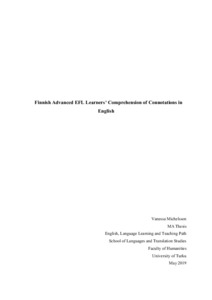Finnish Advanced EFL Learners’ Comprehension of Connotations in English
Michelsson, Vanessa (2019-05-10)
Finnish Advanced EFL Learners’ Comprehension of Connotations in English
Michelsson, Vanessa
(10.05.2019)
Julkaisu on tekijänoikeussäännösten alainen. Teosta voi lukea ja tulostaa henkilökohtaista käyttöä varten. Käyttö kaupallisiin tarkoituksiin on kielletty.
avoin
Julkaisun pysyvä osoite on:
https://urn.fi/URN:NBN:fi-fe2019061119908
https://urn.fi/URN:NBN:fi-fe2019061119908
Tiivistelmä
Connotation is a word’s additional meaning or mental association and it can be perceived as positive, neutral, or negative. In the present study, connotations were looked at in terms of emotional charge, associations or connotative meanings, and overall connotational knowledge. The purpose of this thesis was to investigate the comprehension of Finnish advanced Learners on connotations in English. This was done from three perspectives. First, the approximation of Finnish learners’ knowledge of connotations towards that of native speakers of English was studied. Next, the correlation between the connotation test scores and the use of English during free time was calculated. Lastly, the focus was on finding if there was a correlation between vocabulary size and connotational knowledge.
The participants (N=30) were English majors doing their MA studies at university or had recently graduated within the past five years. To gather data for the study, the participants were required to complete the following: a questionnaire concerning background information and the frequency of using English during free time, a vocabulary size test, and a connotation test. The study used mixed methods by analyzing the data quantitatively and by complementing those results through qualitative means of analyzing the responses of the participants on the tests.
The results indicate that the Finnish learners had the highest approximation in the comprehension of connotations to native speakers in terms of emotional charge. Less than half of the words in the connotation test were fully understood the same way as native speakers in terms of associations and overall connotational knowledge. The results also depict a slight negative correlation between the frequency of personal communication in English and the comprehension of the emotional charge of words. Another finding was a slight positive correlation between the comprehension of associations and the frequency of watching TV series or movies in English. A relationship was not found between overall connotational knowledge and either frequency of using English during free time or vocabulary size. Most of the results were inconclusive due to the small sample size and the ambiguousness of the instructions in the connotation test. Future research should focus on refining the connotation test.
The participants (N=30) were English majors doing their MA studies at university or had recently graduated within the past five years. To gather data for the study, the participants were required to complete the following: a questionnaire concerning background information and the frequency of using English during free time, a vocabulary size test, and a connotation test. The study used mixed methods by analyzing the data quantitatively and by complementing those results through qualitative means of analyzing the responses of the participants on the tests.
The results indicate that the Finnish learners had the highest approximation in the comprehension of connotations to native speakers in terms of emotional charge. Less than half of the words in the connotation test were fully understood the same way as native speakers in terms of associations and overall connotational knowledge. The results also depict a slight negative correlation between the frequency of personal communication in English and the comprehension of the emotional charge of words. Another finding was a slight positive correlation between the comprehension of associations and the frequency of watching TV series or movies in English. A relationship was not found between overall connotational knowledge and either frequency of using English during free time or vocabulary size. Most of the results were inconclusive due to the small sample size and the ambiguousness of the instructions in the connotation test. Future research should focus on refining the connotation test.
